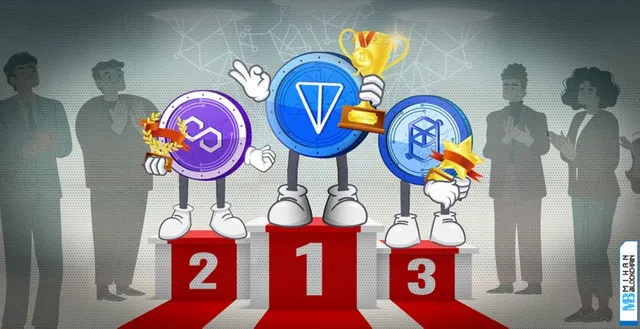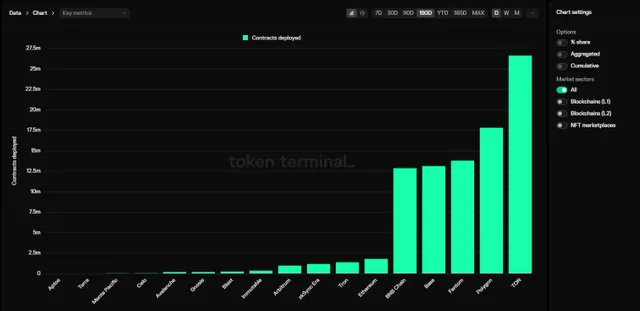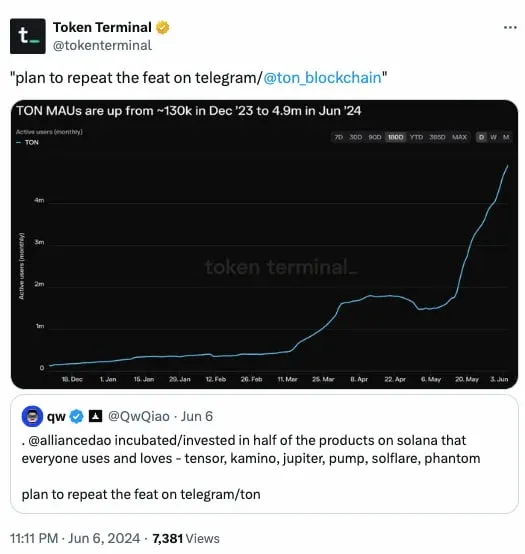The top Blockchains in terms of the number of smart contracts 2024

Hello to all friends
I hope you had a great time.
Today, I wanna talk about top blockchains in 2024
The top blockchains in terms of the number of smart contracts in 2024; Ton network (TON) in first place!
Smart contracts are like agreements on the blockchain. Smart contracts can create tokens or digital items called NFTs, or sometimes perform more complex tasks such as trading, swapping, or verifying identities. Meanwhile, the TON network has won the first rank for the most deployed smart contract with the best security profile in 2024.
In 2024, young blockchains have also performed better because they have more contracts. Especially in terms of safety features, they have also performed better than their older competitors.
TON, in first place
Ethereum is not in first place in terms of the number of deployed smart contracts. Telegram's native blockchain has the largest number of deployed contracts.

The TON blockchain is incompatible with the Ethereum Virtual Machine (EVM) and uses a different approach to creating smart contracts. This blockchain, which works as an open source network, creates smart contracts using the fancy programming language (FunC). Telegram hosts different applications in different categories; including wallets, marketplaces, games, social spaces, etc.
TON blockchain reached this position after the growth of active users in Telegram.

Tone is a blockchain that also hosts several trading bots that require automation for their decentralized services. It also provides sample contracts that can be used as templates for other projects.
After Tun, Paligan is in second place. In 2021, Polygan was the blockchain of choice for deploying smart contracts in the fields of DeFi, Web3, and gaming, and accounted for the largest number of contracts in 2021.
Polygon offers an extra layer of security through its native blockchain explorer. Project owners can confirm their smart contracts in this explorer. Also, Polygan is in the first place in terms of the total number of smart contracts deployed, which may be due to the centralized activity or the deployment of a series of contracts by a single entity. Phantom network is also in the third place and its smart contracts statistics have increased recently. Especially after the news related to the Sonic blockchain and the migration of this blockchain.
Other networks that have a large number of deployers include Tron Network, Arbitrom, ZKSync Era, and BNB China. The exception to this group is the Base blockchain, which has no coins and is ranked fourth and even higher than China's BNB. Base is one of the networks that is among the top 10 in terms of the number of deployers. More than 887.5 entities have deployed contracts on the blockchain base.
Both the Layer 1 and Layer 2 networks compete with Ethereum on various metrics. Ethereum continues to rank higher in terms of fees as well as platforms with the number of active wallets. However, the generation of smart contracts may be a benchmark for activities, including more developers or the process of creating new tokens.
One of the reasons for the high number of smart contracts is the need to launch a new contract for each memecoin. Most of the top blockchains saw a wave of memecoins that especially affected faster and scalable blockchains with minimal fees. Tone is also ideal for moving funds or using contracts due to its low fees.
The importance of auditing smart contracts
Of course, mass deployment of smart contracts in Solidity, Python, or other languages also exposes users to malicious behavior. Usually, a project advertises its audit status and ultimately it is up to the users to check the audit status of the projects. Consequently, networks should not neglect the security of their smart contracts.
BNB China and Ethereum still have the most attacks in the networks. A number of contracts have also shown vulnerabilities in the past, albeit without financial loss. Most smart contracts play a role in some form of decentralized financial or value operation, and even a small
vulnerability can become costly and directly affect markets. Due to a flaw in the logic of the algorithm, smart contracts become extremely vulnerable, especially in bridges, complex protocols or other contracts that can generate new tokens.
For example, last month, smart contract vulnerabilities affected TONUp (Ton Network Launchpad) and stole about $106,000 from a smart contract. Similar attacks happened to BNB China and RedKeyGame apps.
One of the biggest hacks last week involved decentralized exchange Velocore, which lost $6.8 million in Ethereum due to a smart contract vulnerability.

One person also attacked the Orion liquidity aggregator. In general, smart contracts in the DeFi sector were often the target of attacks because they have the most value and locked tokens. The TLN protocol on the BNB China platform lost about $280,000 through a smart contract vulnerability last week.
The vulnerabilities also affect larger projects, such as Gala Games, where a hacker minted 5 billion new Gala tokens. A number of projects are trying to maintain control over their contracts, including the Mint Token shutdown.
As such, it is true that a high number of smart contracts is considered a bonus, but blockchain projects must also be careful to audit their smart contracts carefully. Do you think your blockchain will pass this test?
I hope this article was useful for you.
I think for a long period of time right now, ton network will definitely still be around for a very long period of time certainly. With the arrival of these telegram mining bots, it has increased it so massively
I do agree with you